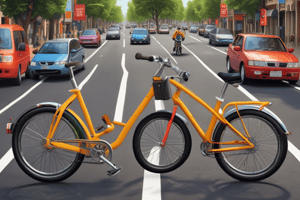Podcast
Questions and Answers
What can significantly reduce the risk of traumatic brain injury in case of a bike accident?
What can significantly reduce the risk of traumatic brain injury in case of a bike accident?
- Not using hand signals
- Avoiding reflective clothing
- Listening to music while riding
- Wearing a properly fitted helmet (correct)
What should cyclists do to abide by traffic laws?
What should cyclists do to abide by traffic laws?
- Weaving through traffic
- Not following traffic signals
- Riding on the correct side of the road (correct)
- Executing complex tricks
How should cyclists indicate a right turn?
How should cyclists indicate a right turn?
- Use no hand signal
- Extend the arm diagonally downward
- Extend the arm straight up
- Extend the arm horizontally (correct)
What should cyclists wear to increase visibility, especially during dawn or dusk?
What should cyclists wear to increase visibility, especially during dawn or dusk?
Which behavior can help prevent crashes for cyclists?
Which behavior can help prevent crashes for cyclists?
Where should the buckle of a helmet rest for proper fit?
Where should the buckle of a helmet rest for proper fit?
What should cyclists avoid doing regarding complex bike tricks?
What should cyclists avoid doing regarding complex bike tricks?
How should hand signals be used to indicate stopping?
How should hand signals be used to indicate stopping?
Flashcards are hidden until you start studying
Study Notes
Bike Safety
Ensuring safety while riding a bike isn't only crucial for yourself, but also for others on the road. Here are essential aspects of bike safety to consider:
Helmet Usage
A properly fitted helmet significantly reduces the risk of traumatic brain injury in case of an accident. Ensure it sits flat on your head, is not tilted back, and fits snugly. Straps should form a 'v' shape under your ears, and the buckle should rest under your chin.
Traffic Rules
Cyclists must abide by local traffic laws and regulations. This includes riding on the correct side of the road, following traffic signs and signals, and using hand signals when turning. Additionally, riding single file and avoiding dangerous behaviors such as weaving or breaking traffic laws can help prevent crashes.
Hand Signals
Clear communication through hand signals is important. Indicate turns by extending your arm horizontally if you're turning right or diagonally upward if you're turning left. Point the palm of your hand downwards to signal stopping.
Visibility
Wear bright, reflective clothing to increase your visibility to motorists, especially at dawn, dusk, or during rainy weather. Reflectors on your bike can also enhance your presence on the road.
Not Performing Tricks
Amateur riders should refrain from attempting complex tricks that require advanced skills. These maneuvers can lead to loss of control and cause severe injuries.
In summary, staying safe while riding a bike involves understanding and applying key principles. By following traffic rules, wearing a well-fitted helmet, using clear hand signals, maintaining visibility, and avoiding unsafe practices, you can greatly lower your chances of experiencing accidents.
Studying That Suits You
Use AI to generate personalized quizzes and flashcards to suit your learning preferences.




